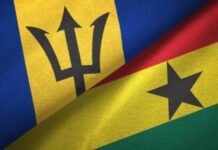
In the North-Eastern border of Ghana, is a small town with its own market north of Navrongo right on the Ghana/Burkina Faso border, which is noted for its sacred pond, and a sanctuary for crocodiles. The second smallest 10 administrative regions in Ghana, occupying a total land surface of 8,842 square kilometres or 2.7 per cent of the total land area of Ghana, precisely located in the Kingdom of Dagbon, is no other town then Paga.
Crocodiles are considered to be very wild creatures, but in the town of Paga crocodiles are very friendly and coexist with humans. The friendly relationship between the crocodiles and humans continue to baffle the minds of many especially visitors. This is normal for the people of Paga but a mystery to visitors. It is a customary offence to harm, kill or show any sign of disrespect to the crocodile of Paga.
Brief History about paga crocodile pond
The history of the crocodiles of Paga is tied to Nave (Nah-vey`), paga`s founder and family head. The story goes back more than many generations ago, with Nave’s father, Prince Panlogo who hails from Tampela and Kampala, now in the present day Burkina Faso.
Panlogo decided to contested for the position of a chief after the father’s death, but lost the chief (Pio) to his younger brother, but not satisfied with the turn of event Panlogo left his sympathizers in the land of Tampela. Supporters from his younger brother’s side followed him and this resulted in a dispute which eventually escalated into bloody and deadly violence.
Panlogo and his people fled from the warfront on horseback, as they came to a powerful river with no other means than to cross with their bare foot, all this while the enemy was giving them hot chase.
In the process of crossing this powerful river they saw crocodiles in the river edge. This made Panlogo and his people to believe that the spirits of their forefathers exist in the crocodiles.
Panlogo came close and pleaded for help with the crocodile, and swore in return for their support neither he nor any of his followers or descendant would kill or harm any of the crocodile or ever eat its flesh if the crocodile help them to cross the river.
Till date, it is not surprising to find children and or visitors sitting at the back or holding the tale of a crocodile without any harm, after a sacrifice of fowl. This is a sharp contrast to the perception about crocodiles being dangerous. It is believed that each native of Paga has equivalent crocodile in the pond representing each person’s soul. To date there are plenty of crocodiles in the Paga pond and crocodile meat is forbidden in the town of Paga. There have been actual instances when deaths of important personalities in the town of Paga coincided with that of some crocodiles.
Calling the Crocodile
The caretaker of the pond, normally invites the crocodiles out of the pond by blowing of whistle and with the waving of a fowl which attract the friendly crocodiles and quickly they grab he fowl with their snouts. Only courageous visitors can sit on, or hold the reptile tail for a good camera work.
Tourist place
Visitors from all walks of life visit this small town every day, and most especially during weekend and Public holidays. The International tourist from different parts of the world that patronage this place add revenue into the national purse with foreign exchange.
Admission fees are charges before you are allow to the crocodiles pond, and this charges are used to help fund community projects. The caretaker charges a fee for the fowl and basic interpretation.
Commercial Activity
On the more commercial side of things the crocodiles have brought a sort of road-side tourist attraction to Paga. The caretakers of the Paga crocodile pond have said that if the place is not distilled it may ruin the existence of the tourist attraction.
The existence of the pond is because of the torrential rains experienced for the years of the existence of the pond. One of the crocodiles which he said is ninety years old and many other of its type needs special feeding to keep them alive.
The only source of feeding the crocodiles is when visitors buy fowls to attract them which he noted is not enough. To keep the pond active all the time, the government and other stakeholders has to come on board, and partner with the town folks to help make Paga the sustainable tourist attraction for all.
By Sheila Williams


























